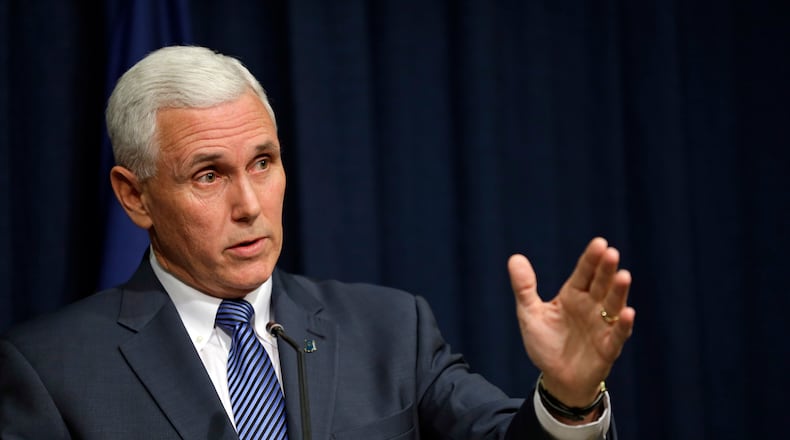Just moved by the Associated Press:
Indiana is the first state to enact such a change this year among about a dozen where such proposals have been introduced. The measure would prohibit state and local laws that "substantially burden" the ability of people — including businesses and associations — to follow their religious beliefs.
Pence, a Republican, backed the bill as it moved through the Legislature and spoke at a Statehouse rally last month that drew hundreds of supporters. The governor signed the bill in a private ceremony.
Pence said in a statement Thursday that the bill ensures "religious liberty is fully protected under Indiana law."
"The Constitution of the United States and the Indiana Constitution both provide strong recognition of the freedom of religion, but today, many people of faith feel their religious liberty is under attack by government action," he said.
Reaction to the decision was swift and divided.
Indiana Right to Life President and CEO Mike Fichter praised the new law, saying it would give abortion opponents legal recourse if they are pressured to support the procedure. The organization circulated an online petition to thank Pence for signing the bill.
Freedom Indiana, which led last year's successful fight against efforts to add a gay marriage ban to the state constitution, called it "a sad day for Indiana," saying Pence and lawmakers ignored concerns of thousands of Indiana residents.
"We made it clear that this law will only be used to harm other Hoosiers, and that's not the Indiana way. The lawmakers didn't listen. The governor didn't listen," the group said in a statement.
At least two groups — the Christian Church (Disciples of Christ) and Gen Con — have said they would reconsider plans to hold their conventions in Indianapolis because of the legislation. The CEO of California technology company Salesforce told the Indianapolis Business Journal his company would reduce its investment in the state because of the law.
Supporters say discrimination concerns are overblown and that the Indiana measure merely seeks to prevent the government from compelling people to provide such things as catering or photography for same-sex weddings or other activities they find objectionable on religious grounds. They note that the law is modeled after a federal religious freedom law Congress passed in 1993 and similar laws are on the books in 19 states.
"This bill is not about discrimination, and if I thought it legalized discrimination in any way in Indiana, I would have vetoed it," Pence said. "For more than 20 years, the federal Religious Freedom Restoration Act has never undermined our nation's anti-discrimination laws, and it will not in Indiana."
However, the current political climate is far different than it was when most of those were approved because the U.S. Supreme Court is expected to rule this year on whether gay marriage bans violate the Constitution.
The Indianapolis chamber of commerce and Columbus-based engine maker Cummins Inc. are among business groups that have opposed the bill on the grounds that it could make it more difficult to attract top companies and employees.
Similar bills have been advancing this year in the Arkansas and Georgia legislatures. Last year, Mississippi enacted a religious objection law just weeks after Arizona Gov. Jan Brewer, a Republican, vetoed a similar effort there amid criticism from major corporations.
"The NCAA national office and our members are deeply committed to providing an inclusive environment for all our events," Emmert's statement said. "We are especially concerned about how this legislation could affect our student-athletes and employees.
"We will work diligently to assure student-athletes competing in, and visitors attending, next week's Men's Final Four in Indianapolis are not impacted negatively by this bill.
About the Author
The Latest
Featured




